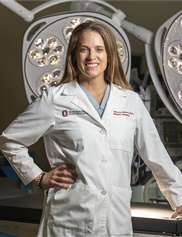Why Choose a Board-Certified Plastic Surgeon
Choose a board-certified plastic surgeon and be confident you are in the care of a highly trained surgeon you can trust.

What is judged to be attractive in women's body contours changes just like fashion trends in clothing and makeup. The buttock area has reached new levels of interest thanks to the influx of the Latin culture from South America and pop culture's fixation on the shapely Kardashians. Surgeons on the cutting edge of buttock enhancement choose to use fat grafting instead of buttock implants to avoid some very difficult complications.
Thanks in part to Drs. Simeon Wall and Constantino Mendieta's contributions to the concepts of tissue equilibration and redistribution in body sculpting, fatty tissue can be removed from areas of excess and transposed to areas of deficiency. For example, we can take excess areas like the muffin top and the lateral thigh and place that fat into the under-projected gluteal areas. This creates the idealized hourglass shape of the lower back while framing the buttock from hipbone to the upper lateral thigh and provides volume enhancement to the gluteal region, which also provides a lifting effect. The results can be quite spectacular with limited downtime.
Of course, you need to find a plastic surgeon with extensive experience in large volume fat grafting. Often times each cheek of the buttocks will receive as much as a liter of fat per side which is significantly more than what is put into the face, hands, or even breasts. Careful techniques of fat harvesting, fat isolation and reinjection are required to maximize the fat grafting take and the avoidance of nodules and fluid cysts. When performed correctly, the fat retention, which is placed into the buttock, should be around 70% long term. After approximately four months, any fat cell that remains should be a long survivor. Of course smoking can be a cause of less fat retention and should be avoided.
The art of fat grafting and the clinical success of fat transfer for body reshaping have outpaced the basic science of the procedure. Much basic science work needs to be done to better understand the biology of fat and wound healing as well as the actual effects of transference of peripheral stem cells as part of this procedure. However, it has been well documented that fat grafting is safe, has low complication rates in experienced hands, and is highly effective for providing volume and shape to a region of contour deficiency of any part of the body.
Plastic surgeons employ biologic tissue as our medium to create beautiful forms of living art. Fat is a wonderful way to sculpt the human body. It is truly like airbrushing imperfections in three dimensions.
For more information, including a list of ASPS plastic surgeons in your community, please use our Find a Plastic Surgeon tool.
The views expressed in this blog are those of the author and do not necessarily reflect the opinions of the American Society of Plastic Surgeons.















